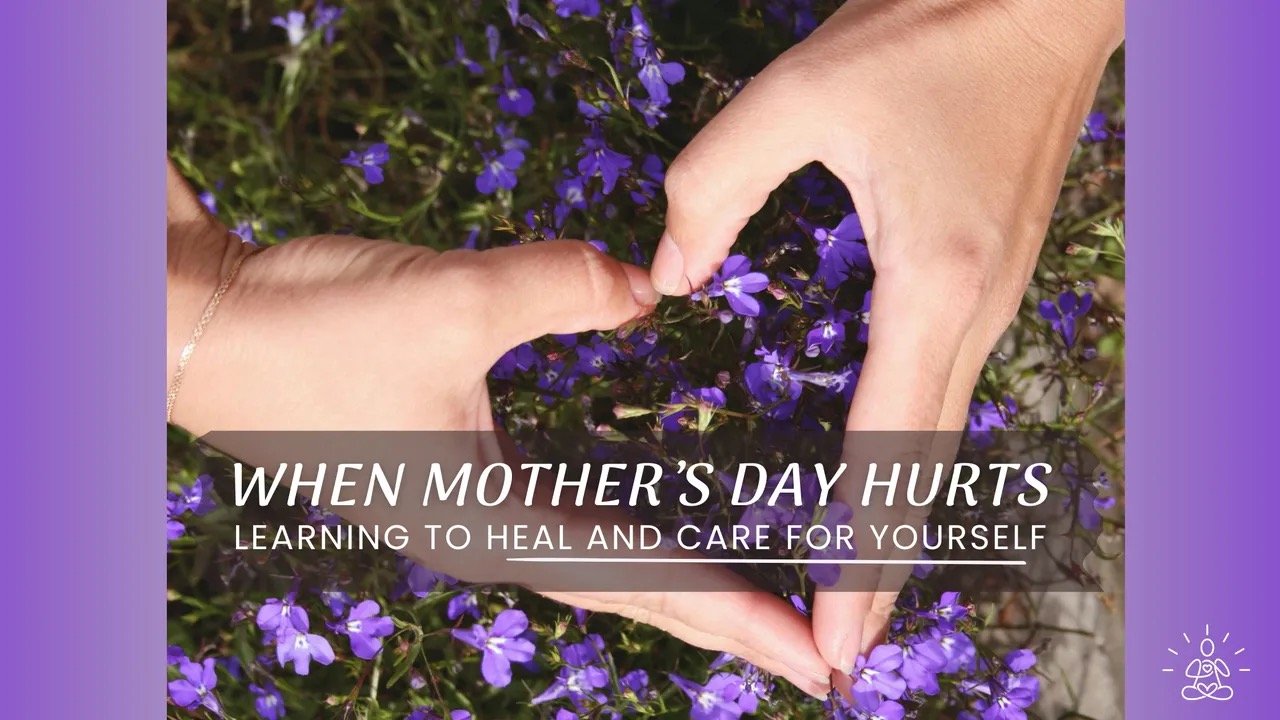When Mother’s Day Hurts: Learning to Heal and Care for Yourself
Mother’s Day can be a beautiful time of celebration, but for some people, it also stirs up sadness, anger, or a deep sense of longing. I sit across from clients every day who carry deep wounds, whether related to their mothers or to their own experiences of motherhood, often feeling isolated and overwhelmed by emotions they didn’t ask for. They find themselves dreading the ads, the social media posts, or even conversations that seem to assume everyone has a close, loving relationship with their mother. I can’t let this day pass without acknowledging their experience. If that’s you, I want you to know that you are not alone. I see you. I feel you. I’m holding space for you as I write these words.
The truth is, motherhood and our experiences of being mothered are not always simple. Some people are grieving a mother who has passed away. Others carry the weight of complicated, strained, or even harmful relationships with their mothers. Some feel a deep ache from wanting to be a mother themselves, while facing challenges or loss. And some mothers wrestle with guilt, exhaustion, or the pain of a difficult relationship with their own children. At best, it’s bittersweet; at worst, the pain feels unbearable.
You might be wondering why this day, or this relationship, can hit so hard. Sometimes, even when you think you’ve made peace with it, the feelings resurface. In fact, it’s more common than many people realize, and your feelings deserve attention and care.
Why These Feelings Run Deep
Our connection to a mother or mother figure is often our first and most formative bond. This relationship begins even before birth. Research shows that a sense of safety starts developing in the womb, as a baby responds to the rhythms of their mother’s voice, heartbeat, and overall environment. These early experiences shape how we will view ourselves, seek comfort, and relate to others in the future. After birth, that need for safety and connection deepens through nurturing touch, attunement, and consistent emotional presence. Together, these interactions teach us how to regulate emotions, form secure attachments, and build trust in the world around us.
Our brains are wired for attachment. When that bond is fractured, absent, or unhealthy, it can disrupt the development of key skills like self-soothing, trust, and resilience. Over time, these early wounds may show up as anxiety, low self-worth, or difficulty forming secure relationships. And while these patterns are often lifelong, they tend to surface most acutely during emotionally charged times like Mother’s Day, when reminders of that foundational relationship are everywhere.
These wounds might look like:
Feelings of unworthiness or self-doubt
Struggles with boundaries or attachment
Persistent people-pleasing or fear of abandonment
Anger, grief, or numbness you can’t fully explain
It’s important to recognize that these reactions are normal responses to unmet needs. More often than not, they began as self-protective coping strategies—your mind and body’s way of keeping you safe in an environment where love, safety, or stability were uncertain. Patterns like people-pleasing, anger, or dissociation (emotional numbness or detachment) may have helped you avoid greater harm at the time, even if they feel limiting or painful now. The good news is that healing is possible, even if your relationship with your mother never changes.
What It Means to Mother Yourself
One of the most powerful steps in healing from mother wounds is learning to “mother yourself.” This means giving yourself the care, comfort, and protection you may have missed growing up, or simply reinforcing what you need more of now.
Mothering yourself can look like:
Offering yourself kindness and patience when you make a mistake
Honoring your needs, even when others don’t understand them
Protecting your time, energy, and emotional well-being through healthy boundaries
Speaking to yourself with gentleness rather than harsh criticism
Creating rituals that nurture your sense of safety and peace
In therapy, we often talk about reparenting or self-parenting, which is a process of dismantling old, unhelpful patterns and actively creating new, healthier ways of relating to yourself. It’s an opportunity to rewrite the experience of being parented by giving yourself the support you didn’t receive as a child.
This can be a slow, ongoing journey. Just like parenting a child, this work takes time. Your original parenting, whether nurturing or neglectful, wasn’t a one-time event. It happened day after day, over years. Reparenting yourself requires patience, commitment, love, and compassion. It’s not called parenting for nothing; no one learns to parent in a single day. This is slow, layered work, and every small step you take is meaningful.
When You’re Grieving the Dream of Motherhood
I also want to honor the pain that comes from longing to be a mother and facing loss or heartbreak along the way. For women navigating infertility, miscarriage, or the loss of a child, Mother’s Day can be an especially raw and isolating experience. It can stir up grief, anger, or an aching emptiness that’s hard to put into words.
This type of grief often goes unseen or unspoken, but it is no less real or worthy of care. Whether you are holding space for a child you hoped for, one you carried, or one you loved and lost, your love and your pain matter. Please know that tending to your own heart—protecting it, nurturing it, and allowing yourself to grieve—is a vital part of your healing. You're allowed to not feel "okay" today and always. There’s no timeline for grief, and no need to force yourself to move on or hide your hurt.
In the next section, I’ll share some gentle steps that may support you during this time, including connecting with others who have walked a similar path.
Gentle Steps Toward Healing
If this Mother’s Day feels tender or difficult for you, here are a few ways to care for yourself:
1. Name Your Feelings
Instead of pushing discomfort aside, try naming what’s coming up: sadness, anger, emptiness, relief, even joy mixed with guilt. Naming emotions helps you process them rather than suppress them.
2. Create Boundaries
It’s okay to mute social media accounts, decline invitations, or set limits around conversations that feel too heavy. Protecting your emotional space is a form of self-respect.
3. Find Comfort in Small Rituals
Light a candle, take a quiet walk, or spend time with people (or pets) who feel safe and comforting. These moments remind your nervous system that you are cared for, even by yourself.
4. Consider Writing a Letter
Write a letter to your mother and/or child (whether they are present, estranged, or no longer living), or to your younger self. Say the things you’ve never said out loud. You don’t need to send it; this is for your own healing.
5. Connect with Others Who Understand
Seek out spaces such as support groups, online communities, or trusted friends, where you can share your experiences with people who truly understand. Being witnessed in your grief can be a powerful step toward healing.
Navigating Mother’s Day with Compassion
Mother’s Day doesn’t have to be all or nothing. It can be a time to honor what you’ve lost, what you’ve survived, and what you are still building within yourself. Healing isn’t about forgetting the past; it’s about learning to meet your own needs with love, compassion, and gentleness.
If you are noticing that this season is affecting your well-being—whether through complex trauma, anxiety, grief, or depression—please know it’s okay to seek support. Therapy can be a powerful space to unpack these experiences and begin your healing journey. I invite you to contact Graceful Mind Therapy if you’re ready to explore support. You can also visit the About Maria page to learn more about my personal and professional journeys.
by Maria Perdomo-Torres, LCSW-S, MHA, CFSW




